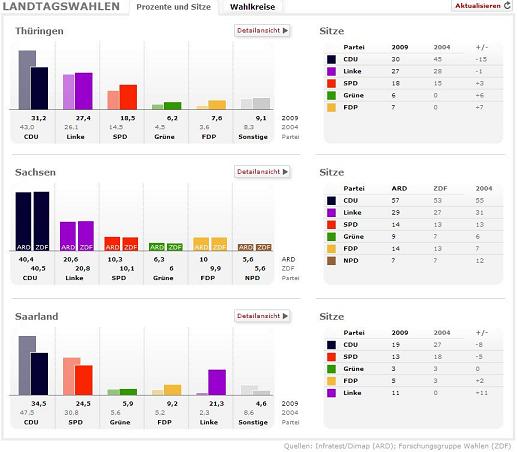While the coverage in the English version of Der Spiegel is all about how badly the CDU did in the state elections held today in Thüringen, Saarland and Sachen, reading the German language shows that the big winner of the election was Die Linke, the post-communist East German communist party.
Die Linke may have looked as just a rebranding campaign by the old East German ruling party, but to everybody’s surprice seems to have genuinely reinvented itself as a proper socialist, populist party and was helped a lot in this by the defection of Oskar Lafontaine from the SPD, the social democrats. That gave it a respectability in the west of Germany it had lacked before when it was still the PDS, the Party of Democratic Socialism. Then it was still seen as a party full of unrepentant Stalinists only popular in the East under those still suffering from ostalgie, the yearning for the old securities of the DDR. Even before the official rebranding of 2007 the party had shown it could appeal to western voters as well, when still in alliance with LaFontaine’s then party, the WASG, during the 2005 elections it at one point was predicted to become the third largest faction in the Bundestag.
But today’s result is much more significant. That the party did well in Thüringen and Sachsen was expected: both are in east Germany. But that it did well in Saarland as well, well enough to be able to form a coalition state government with the SPD and the Greens, is impressive. True, Saarland is where Lafontaine got his start in politics, serving as its minister-president for 13 years from 1985-1998, but coming from nowhere to gaining 11 seats is a sign that German voters are dissatisfied with the traditional parties and looking for more radical solutions. As everywhere else, the economic recession is paid for by the poor to bail out the rich, hence the appeal of a party that’s unashamedly socialist and not afraid to blame the rich, to blame capitalism for its crimes.
